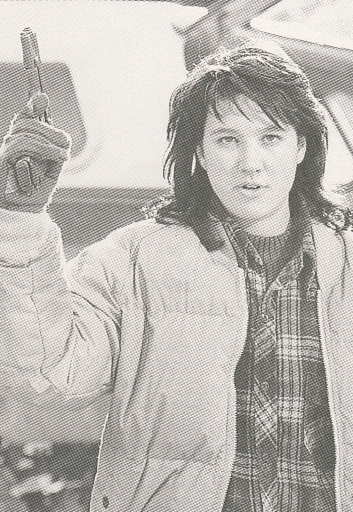Monday, October 3, 1988.
THE SQUAMISH FIVE. Written by Ken Gass and Terence McKenna. Music by Marty Simon. Directed by Paul Donovan. Running time: 97 minutes: Presented at the 1988 Vancouver International Film Festival.
AS NEWS, IT IS a story out of sync with the times.
As drama, The Squamish Five, director Paul Donovan’s attempt to turn the tale of Vancouver’s terrorist bombers into a movie thriller, suffers from the same déjà vu.
Was it really in 1981 that 18-year-old Judy Belmas (played here by Robyn Stevan) met self-described “urban guerrilla” Brent Taylor (Michael McManus) and his commune mates Ann Hansen (Nicky Guadagni) and Doug Stewart (Albert Schultz)?
Did they really call shoplifting food “expropriating dinner” and malicious vandalism “direct action”?
After Julie's boyfriend Gerry Hannah (David McLeod) joins the group, the “direct action” becomes “heavy duty”. They target military contractor Litton Industries' plant in Toronto, and then three Vancouver adult video stores, for destruction.
Because you “can’t finance real terrorist action on welfare cheques,” the practical Brent plans an armed robbery.
How quaintly 1960s it all looks. For that reason, though, Donovan’s picture is small comfort for those who claim there is such a thing as Canadian culture (or included his feature in the local film festival’s “Canadian Images” unit).
The five, if screenwriters Ken Gass and Terence McKenna are to be believed, were leftovers from some radical U.S. campus movement. Donovan’s feature, recalling the 1975 Sissy Spacek telefeature Katharine, tells its story from disillusioned teen Judy’s point of view. It is a depressingly unoriginal throwback to the days when such things were fashionable below the border.
The above is a restored version of a Province review by Michael Walsh originally published in 1988. For additional information on this archived material, please visit my FAQ.
Afterword: The real people who called themselves "Direct Action" (and the media called the Squamish Five) were arrested in January, 1983. Charged with the Red Hot Video store bombings, they were tried, convicted and sentenced to prison terms ranging from six years to life. All have since been released. In 2001, Ann Hansen published Direct Action: Memoirs of an Urban Guerrilla setting out her side of the story. More recently, online publisher Bob Kronbauer recalled their story in an opinion piece headlined Will we soon see a repeat of the Squamish Five domestic terrorism acts of the 1980s? Posted on the Vancouver Is Awesome website, it reflected Kronbauer’s concern that the divisive issue of the Trans Mountain pipeline expansion (TMX) could result in a return to Direct Action-like protest. Last Tuesday (June 18), one day after Canada’s Parliament declared a climate emergency, the federal government approved the TMX project. The words “cognitive dissonance” come to mind, and Kronbauer’s fears seem that much more real.
Halifax-based Paul Donovan was a better director than the above brief review suggests. He’d probably agree that the two pictures he shot in Vancouver — 1988’s The Squamish Five, made for CBC-TV, and Tomcat: Dangerous Desires (1994), a low-budget horror film — were not his best work. I was more impressed with two features he made on the Atlantic coast for his own company, Salter Street Films. In the Afterwords to the postings for both his 1989 Hallowe’en fantasy George’s Island and his sharp political satire Buried on Sunday (1993), I go into more detail about his importance to Canadian film. Paul Donovan turns 65 today (June 26).
